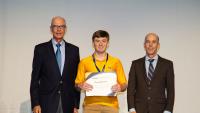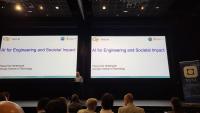2 min read
Georgia Tech students received the 2023 Award of Excellence from the American Association of State and Local History for the Coffee County Memory Project
3 min read
Researchers have developed an AI model that learns the underlying physics governing movements of nanoparticles
2 min read
Georgia Tech engineers have the solar system covered, with projects hundreds — or millions — of miles from home.
6 min read
Though artificial intelligence has become nearly ubiquitous, from smartphones to chatbots to self-driving cars, its impact on health care so far has been relatively low.
4 min read
Georgia Tech is helping Panama develop its first National AI Strategy that unites government, academia, and industry to harness AI for social good.
2 min read
Pascal Van Hentenryck opened Giga’s inaugural “Giga Talks” by exploring how AI can improve lives across sectors like healthcare, mobility, and education.
2 min read
Georgia Tech has been recognized in a new IDC white paper, A Blueprint for AI Ready Campuses: Strategies from the Frontlines of Higher Education, as a national leader in deploying artificial intelligence across higher education.
1 min read
A new study shows how the material made from leaves and branches that collect on forest floors can be mixed with local soil to filter out road grime before it reaches waterways.
1 min read
Researchers at Georgia Tech have developed a new approach to cancer imaging and therapy.
3 min read
Pascal Van Hentenryck, director of Tech AI, delivered a keynote at IFAC MIM 2025, highlighting how the fusion of AI, optimization, and control is transforming engineering and industrial systems.















